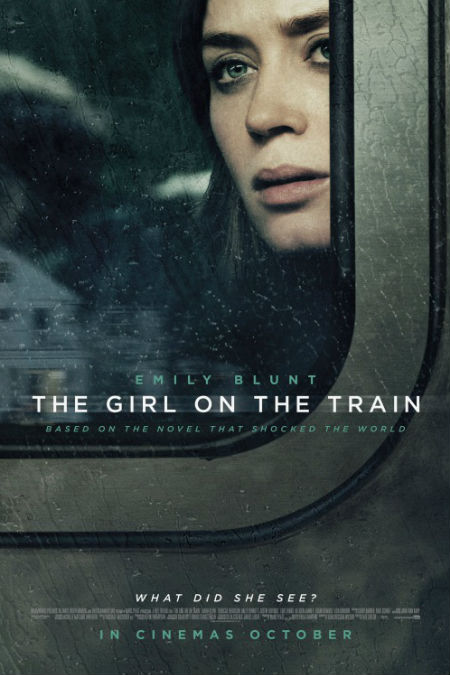
It’s early on in Tate Taylor’s The Girl on the Train, based on the bestselling book of the same name by Paula Hawkins, that you realise how supremely broken Rachel Watson (Emily Blunt) has been left by recent events in her life.
Riding to and from New York each day to a job that no longer exists, Rachel takes the commuter train that snakes along the curves of a scenic bay right past the house where she used to live with her husband Tom (Justin Theroux).
Now remarried, Tom and his new wife Anna (Rebecca Ferguson), Tom’s ex-mistress, have the life and the baby that Rachel so desperately craved when she lived in what, to all intents and purposes, looks like an idyllic picture-perfect slice of the American suburban dream.
Each day she looks on Tom and Anna’s life together and that of her neighbours, Scott and Megan Hipwell (Luke Evans and Haley Bennett respectively), convinced that true happiness waits for her just beyond the tracks on which her train conveniently stops each day.
A chronic alcoholic, who swaps her water for vodka in the drinking bottle she carries with her everywhere, Rachel is ruinously trapped in a suffocating miasma of regret and loss, playing what might have been over and over in her mind.
She is particularly convinced that Scott and Megan have the perfect life she’s always dreamed of; based on the extraordinarily brief snatches of their life that she sees, Rachel concocts a romantic union so blissfully serene and complete that it couldn’t possibly exist in the real world.
Rachel, however, pays this no heed, preferring her alcohol-soaked visions of the Hipwells’ supposed cozy domesticity to the fractured reality which is revealed in increments through Megan’s sessions with her shrink, Dr Kamal Abdic (Édgar_Ramírez), with whom she is having an affair of sorts.
No one has the perfect life, least of all Rachel, with the tightly-played out screenplay by Erin Cressida Wilson, playing fast and loose with our perceptions, reality and fantasy mixing together until it’s hard to be sure what is real and what is not.
It’s a thoroughly effective sleight-of-hand that keeps you guessing throughout much of this expertly-paced film.
While on the surface pitched as a film noir crime thriller with Rachel, by virtue of her drunken blacked-out wanderings through her old suburb the prime amnesiac suspect – she can never recall what happened during those sloshed ramblings, relying on Tom when they were married and now friends and strangers to fill in the blanks, not always accurately – the film is every bit as much about the brokenness of people, how it manifests itself and the way in which those responsible for that brokenness wreak their carnage.
Moving between the viewpoints of Rachel (mainly), Megan and Anna, and filling in the pieces with an enticing glut of red herrings and clever misdirects, The Girl on the Train builds a picture of a world fractured along almost-irreparable lines.
Far from Rachel’s vodka-soaked perceptions of lives untrammeled by discontent and sadness, there’s almost no one in the film who isn’t scarred in some way or gravely disappointed in the unsatisfying route on which life has taken them.
What’s key though is how the brokenness is handled.
As Rachel, Emily Blunt in quite possibly one of her finest performances to date, all anguished nuanced and visceral pain and tortured introspection, projects a woman at a loss to know how to move forward.
She drinks to forget, much as she did during her marriage, stumbling through the wreckage of her life with little sense of meaningful direction, trapped in a past that didn’t even really exist when it was the present, she can’t conceive of what form the future might take since the only thing filling up her view is her broken, regret-laden past.
Through every anguished close-up of her eyes, every slurring attempt to engage with the world, captured in all their miserable intensity by Charlotte Bruus Christensen’s darkly-lit, grey-washed cinematography, we see someone who can’t leave the past behind, can’t fully interact with the present and who has no idea of where the future will take her.
The thing is that she is not alone in her torment, and even as the cops pursue the case of Megan’s disappearance – her loss troubles Rachel deeply primarily because it represents an intolerable rupture of her alternate fairytale-esque lifestyle – with one in particular Detective Sgt. Riley (Allison Janney) simultaneously playing good and bad cop, it becomes apparent that life in upstate New York is not even remotely close to what Rachel imagined it to be.
An artfully-shot, highly-intelligent tale of humanity’s propensity to gloss over or wallow in its misery, depending on what’s needed to get through the day, The Girl on the Train deftly reveals its secrets in such a way that you remain utterly engrossed right to the end.
Granted the ending does cleave a little too closely to the standard finish of your average crime thriller – this is one narrative that would have benefited greatly from the police arriving just-in-time – and melodrama does creep in a little from time to time, but mostly the film holds its melancholy in check, its slow-burning plot and meticulous assembly of the true nature of Rachel’s reality rewarding those patient enough to stick with it to the end.
Draped in unremittingly grey visuals and a penchant for lingering, sometimes near wordless shots and carefully-spoken conversations, The Girl on the Train is a taut, utterly immersive thrilled that is less concerned with the whodunnit aspect of the plot than it is with the messy life decisions that got everyone to the point of no return in the first place.